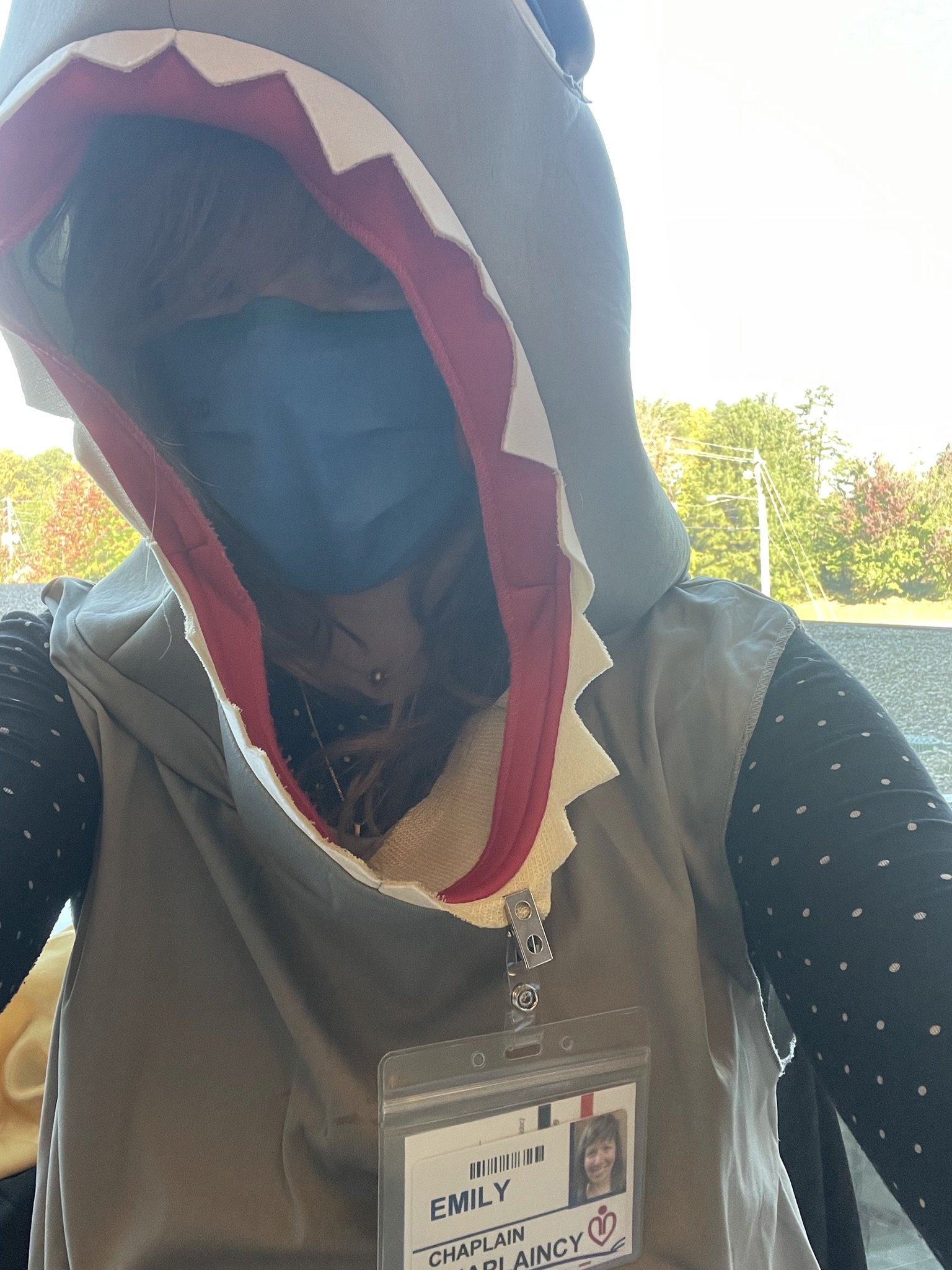what is a chaplain?
This week we had an assignment in my Intro to Chaplaincy class: Answer the question “what is a chaplain?”
It’s a question I get asked a lot when I tell people I’m training to be a chaplain, and I still don’t have a concise answer. Traditionally, chaplains are pastoral care providers who attend to people’s spiritual needs, often in moments of loss or tragedy. Historically, chaplaincy grew out of Christian ministry so there’s a lot of overlap in the responsibilities, competencies, and training of ministers and chaplains.
My hospital chaplaincy ID badge on the first day of my field placement last year.
In the real world, the answer to “what is a chaplain?” is…nobody knows. Chaplains don’t have standardized training or licensing the way therapists do, though we provide some of the same services. Though historically rooted in Christianity, a chaplain doesn’t need the endorsement of a religious body–Christian or otherwise–the way a pastor or priest does. Many chaplains have an MDiv degree and participate in a training program called Clinical Pastoral Education, but neither of those are requirements. Because the term “chaplain” has so much ambiguity, nobody even knows how many chaplains there are. For the most part, you’re a chaplain if you self-identify as a chaplain.
There were a lot of different answers to the “what is a chaplain?” question in my Intro to Chaplaincy class this week, and there were a few themes that kept popping up. Chaplains provide a “ministry of presence” and offer comfort to people in need. Chaplains have a spiritual or transcendent aspect to the care they provide. Chaplains are tied to a specific location or space, like a hospital, school, or the military. Chaplains are concerned with ethics and morals. Chaplains are “spiritually multilingual” and provide care to individuals from across the religious spectrum. Chaplains are good listeners, empathetic, compassionate, and non-judgmental.
This shark god is a chaplain and I will not be entertaining arguments to the contrary.
Personally, my practice of chaplaincy is a bit like “spiritual therapy.” I’m concerned with people’s feelings and helping them feel better. I’m a companion to people during difficult moments so they don’t need to navigate their pain alone. Though my personal religious beliefs are mostly Buddhist, my chaplaincy practice isn’t tied to any specific religious tradition. I call myself an “eco-chaplain” because I usually turn to nature rather than religion as a source of wisdom and guidance. I minister to the “spiritual but not religious” population, because even though many people are (for good reason) turning away from institutionalized religion, they still have the same spiritual needs that humans have always had. My work centers on meaning-making, finding our authentic selves, and aligning to our true purpose.
Everyone needs a chaplain at one point or another, even if they may not realize it. There’s a huge demand for the types of services that chaplains provide. I worry, however, that chaplains as a whole may not be receiving the best training to provide those services. I constantly hear things like “chaplaincy is an art, not a science” and “you can’t teach chaplaincy, you have to learn through doing.” Those things are simply not true. As with any care-based profession, sure, there’s an art to managing interpersonal relationships; but you can’t do art wrong, and you definitely can do chaplaincy wrong. There are almost no evidence-based or research-backed best practices for effective chaplaincy, and I’ve been shocked at the extent to which the entire field of chaplaincy seems ignorant of the evidence-based best practices that are taught in the field of psychotherapy. I entered my MDiv program expecting to learn a lot of the skills that therapists need to learn; instead, I’m learning a lot of the theology that Christian ministers need to learn–despite the fact that chaplains, unlike ministers, are called on to serve people who aren’t Christian. That’s why I’m supplementing my MDiv education with Internal Family Systems therapy training, so that I can help people feel better with research-based methods rather than by quoting Bible verses.
I was a shark chaplain for Halloween at the hospital last year. My fellow chaplains & I walked around the floors handing out candy to cheer up the staff.
I’m excited to stretch the boundaries of “what is a chaplain?” through my field placement this year, which is at an innovation lab. I know through my own experience as an entrepreneur that there’s a big spiritual side to the process of innovation and creation that often goes overlooked. Stay tuned and we’ll see what happens next!


